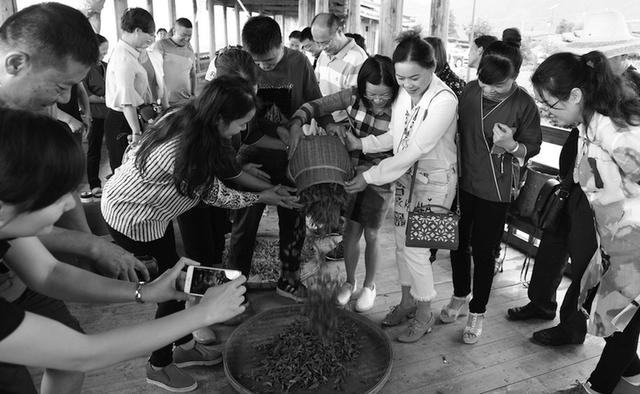
Tourists experience tea making in fairy mountain Tea Garden, Buyang Village, Bajiang Town, Sanjiang Dong Autonomous County.
At the beginning of the new year, in Buyang Village, Bajiang Town, northwest of Sanjiang Dong Autonomous County, Guangxi, the clumps of tea are green and dripping under the warm sun, and tourists and villagers walk through the mountains, setting off each other with Dong Village and Gallery Pavilion, which is beautiful.
Sanjiang Dong Autonomous County, located at the junction of Guangxi, Hunan and Guizhou provinces, has a superior natural environment, and is internationally recognized as a "golden tea-producing area". Its latitude and unique climatic conditions have given birth to "the first tea in early spring in China"-Sanjiang early spring tea. In recent years, Sanjiang Dong Autonomous County has adhered to the development strategy of "establishing the county by ecology and enriching the people through tourism", grasped the advantages of cultural resources and regarded the development of rural tourism as an important support to promote rural revitalization.
In the past, Buyang village was once a well-known poor village. "In the past, we used to have the saying that’ the mountains and waters are far away from Buyang Village, and there are women who don’t marry Buyang Lang’." Wu Ronghua, a villager in Buyang Village, told reporters that the village was relatively backward in the past, and now the tea industry in the village has developed. In addition to planting tea, tourism has become an important source of income for villagers.
It is understood that the tea garden in Buyang Village covers an area of more than 3,900 mu. In 2015, Buyang Village established a modern characteristic agriculture (core) demonstration zone in Guangxi, and the infrastructure in the village has been continuously improved, and the quality of tea has also been improved. At the same time, Buyang Village innovatively carried out the "three changes" reform of changing resources into assets, farmers into shareholders, and funds into shares, allowing villagers to invest in natural resources, land and cash, relying on more than 3,900 mu of ecological tea gardens in the village to successfully build a national 4A-level tourist attraction, and developing tea garden sightseeing, tea garden research, tea garden homestay and other special tourism projects, so as to turn tea gardens into parks, tea areas into scenic spots and tea hills into "golden mountains", and drive villagers out of it.
At present, Sanjiang Dong Autonomous County has 490 tea processing entities (cooperatives, family farms and companies), 18 key leading enterprises of agricultural industrialization at or above the municipal level, 5 key leading enterprises of agricultural industrialization at the district level, and 3 core demonstration areas of tea agricultural industry at or above the three-star level in the autonomous region. There are 317 registered tea trademarks and 300,000 tea growers and tea makers. The tea industry has covered 162 villages in the county, and 98 poverty-stricken villages in Sanjiang Dong Autonomous County have achieved full coverage of the tea industry, which not only provides solid industrial support for poverty alleviation, but also gives new momentum to rural revitalization. As a typical representative, Buyang Village, in order to further accelerate the transformation and upgrading of the tea industry and vigorously promote the scale, industrialization and brand development of the tea industry, has formed a whole industrial chain integrating seedling raising, planting, management, picking, processing and sales, and registered tea brands such as Buyang.
In 2018, Buyang Village successfully established a national 4A-level tourist scenic spot, Buyang fairy mountain Scenic Spot, relying on ecological tea gardens. There are many scenic spots in the scenic area, such as Four Seasons Red Maple Forest, fairy mountain Dong Village, Hongjun Road, Xianren Ancient Tea Garden, Tea Bathing Camping Area, etc. The Dong folk culture and tea tour cultural performances and tourism projects such as watching the sunrise in tea gardens, tea-picking experience, a hundred banquets, Dong songs, and Lusheng stepping on the hall are deeply favored by tourists, allowing tourists to enjoy the fun of tea picking, making and tasting, and at the same time deeply feel the rich connotation of Dong excellent traditional culture, forming an ecological, sightseeing and tourism collection.
"There are many tourists who have come to eat and stay here these days on New Year’s Day, and their income has doubled compared with the same period last year." On January 3rd, Xie Hui, the owner of Aichashi Hotel in Buyang Village, said that the bonus brought by the development of rural tourism in Buyang Village was hard to hide. "We also bring goods through live broadcast and sell tea online, which can earn more than 300,000 yuan a year."
Nowadays, Buyang Village has become a well-known punching point in online celebrity. Every holiday, tourists come to Buyang in an endless stream, and tea is very popular. "Now there are 15 homestays and 11 farmhouse restaurants in the village, and the facilities around the tea garden are perfect, which can basically meet the needs of tourists to eat, live and travel." Xie Xunting, secretary of the General Party Branch of Buyang Village and director of the village committee, told the reporter that from 2018 to 2022, the cumulative number of tourists in Buyang fairy mountain Scenic Area reached more than 2 million, and the total tourism revenue reached more than 70 million yuan. (Reporter of the newspaper in Guangxi Binyang correspondent Mo Qu)
Source: China Culture News.
Reporting/feedback
关于作者